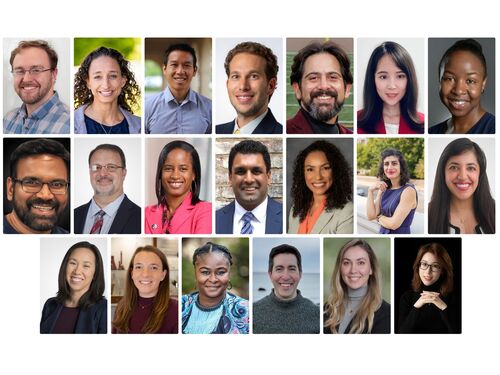Gulf Research Program Awards Nearly $2M to Empower the Next Generation of Community Resilience Leaders
News Release
By Pete Nelson
Last update January 23, 2024
WASHINGTON — The Gulf Research Program of the National Academies of Sciences, Engineering, and Medicine announced awards today totaling almost $1.97 million to fund four projects that empower the next generation of community resilience leaders in the Gulf of Mexico and Gulf of Alaska.
The awarded projects provide leadership training programs for youth aged 15-24 that equip participants with the knowledge, skills, and expertise necessary to build resilience to climate hazards and associated disasters in their communities.
Communities in the coastal regions are facing numerous complex and interrelated challenges stemming from climate change, including cultural losses, population displacement, flooding, extreme heat, wildfires, and more frequent and severe storms. The effects of climate change are taking a particular toll on youth, who not only experience the hazards of a changing climate but also have limited power to influence decision-making to mitigate its effects. In a study published in Lancet Planetary Health, which polled 10,000 youth and children from 10 countries, 59% of respondents reported that they were very or extremely worried — and 84% were at least moderately worried — about climate change. More than 45% of respondents said their feelings about climate change negatively affected their daily lives.
“Research shows that youth engaging in collective climate action in their communities can reduce feelings of anxiety and hopelessness that can lead to significant mental health outcomes,” said Daniel Burger, senior program manager of the Gulf Research Program’s Gulf Health and Resilience Board. “We believe these projects will help the next generation build the knowledge, skills, and leadership capacity they need to effect change in building stronger, healthier, more equitable, and resilient communities.”
The awarded projects are:
Expanding and Diversifying Youth Climate Resilience Opportunities in Coastal Mississippi
Project Director: Alison Rellinger, Mississippi State University
Project Location: Harrison and Jackson Counties, Mississippi
Award Amount: $499,379
Project Team:
- Renee Collini, The Water Institute of the Gulf
- Larissa Lee, Mississippi State University
- Nastaran Tebyanian, The Water Institute of the Gulf
Project Summary:
This project aims to address the lack of diversity and limited opportunities in the climate resilience workforce by creating a fellowship program for young adults (18-24) from traditionally underrepresented groups. The goal is to develop a more diverse climate resilience workforce that reflects the communities of the northern Gulf Coast. The project has several objectives, including providing hands-on experience in coastal climate resilience to six early-career professionals, conducting a six-month training program on coastal climate resilience for fellows and other young adults, and implementing a communication campaign on climate resilience designed by the fellows. The target audience for the project is young adults from underrepresented groups, such as Black, Indigenous, and other people of color, individuals with low incomes, and individuals from rural areas who have recently completed a workforce development program, a two-year degree program, or four-year degree program. The fellows will be treated as full-time professionals during their tenure, contributing to their host organizations while also pursuing their own interests and professional development. The project will disseminate its results through a report that includes best practices, lessons learned, and evaluation results. The project team will also share its findings with professional networks and organizations in the climate resilience field. Overall, this project aligns with the mission of enhancing community resilience in the Gulf region by addressing diversity and equity issues and empowering young adults to take leadership roles in climate resilience actions.
Florida Resilience Corps: Training and Engaging Northwest Florida’s Opportunity Youth to Be Resilience Leaders
Project Director: Joseph “Joe” Taylor, Franklin’s Promise Coalition
Project Location: Escambia, Santa Rosa/Walton, and Franklin Counties, Florida
Award Amount: $490,373
Project Team:
- Tommy Cleversy, Volunteer Florida
- Jeff DeQuattro, The Nature Conservancy
- Anita Grove, Apalachicola National Estuarine Research Reserve
- Angela Lindsey, University of Florida
- Stephanie Mathes, The Corps Network
Project Summary:
The Florida Resilience Corps (FLRC) is led by a coalition of management partners who have collaborated for over eight years: University of Florida IFAS PIE Center/EDEN, Apalachicola National Estuarine Research Reserve/Florida Office of Resilience and Coastal Protection, the Nature Conservancy’s GulfCorps Program, Volunteer Florida’s CERT Program, the Corps Network, and Franklin’s Promise Coalition. The collaboration has built the vision for FLRC on the outcomes of three successful endeavors: the NIEHS Healthy Gulf/Healthy Communities Study (2010-2014), which identified the need for engaging vulnerable populations in environmental stewardship and disaster readiness; the National Academies of Sciences, Engineering, and Medicine’s Capacity Building Grant, Strengthening Gulf Coast Resilience by Engaging, Educating and Empowering Vulnerable Populations (2017-2020), and the Nature Conservancy’s GulfCorps Program funded by NOAA through the RESTORE Act (2017-present).
FLRC will engage no less than 60 youths over two years to complete eight weeks of climate/disaster resilience training and 18 weeks of disaster mitigation field projects such as living shoreline construction, marsh restoration, and wildfire fuel reduction in four Northwest Florida communities that are designated as disadvantaged by the Climate and Economic Justice Screening Tool. The project will leverage AmeriCorps’ Opportunity Youth Service Initiative resources to provide weekly stipends, professional development training, climate change education, and disaster preparedness certifications. The coalition partners have a long history of successful work among underresourced communities and extensive experience operating youth conservation corps as a strategy to build community resilience and connect youth to sustainable careers, all while completing climate change mitigation field projects.
Resiliency: Empowering Gulf Coast Youth in the Face of Disasters
Project Director: Charles White, Charity Productions
Project Location: Port Arthur, Texas
Award Amount: $499,619
Project Team:
- Benika Dixon, Texas A&M University
- Jaimie Masterson, Texas A&M University
- Michelle Meyer, Texas A&M University
Project Summary:
This program will develop youth leaders knowledgeable in climate change and its effects on community disaster resilience and provide educational pathways from high school to college and onto careers in climate resilience, specifically emergency management, urban planning, and public health. Building upon a successful program in Port Arthur, Texas, the program will engage underrepresented high school students (ages 15-18) in emergency management, urban planning, and public health research related to climate change and climate justice.
Students will participate in two complementary components: a dual high school/college credit curriculum and an in-residence summer camp with disaster and climate faculty. The program will reach up to 180 students over three years. Students will learn about the core capabilities built into emergency management and best practices for mitigating threats and adapting to all types of hazards while earning college credits. Students will gain exposure to the college programs for these careers, motivating them to continue learning and engaging with climate advocacy and science. Additionally, the curricula developed for the academic curriculum and summer camps will be made available for other schools to use. The program’s target communities and schools have high populations of historically underrepresented and low-income students. Because emergency management, urban planning, and public health fields need increased participation from professionals of various racial, ethnic, and economic backgrounds, this program aims to diversify the next generation of disaster professionals, which sits at the front line of addressing climate risk.
Inspiring Seascapes: Growing climate-resilient youth through science and art expeditions in the Gulf of Alaska
Project Director: Joanna Young, University of Alaska, Fairbanks
Project Location: Fairbanks, Alaska
Award Amount: $479,295
Project Team:
- Amy Bishop, University of Alaska, Anchorage
- Sarah Clement, University of Alaska, Fairbanks
- Alexandra Ravelo, University of Alaska, Fairbanks
Project Summary:
Inspiring Girls Expeditions Alaska offers 12-day unique, tuition-free, backcountry expeditions for high school youth that combine science, art, and outdoor exploration. The project proposes to leverage their proven expedition model to meet the Gulf Research Program’s goals of empowering the next generation of community resilience leaders. It will host one of two sea kayaking expeditions per summer that take place within the Gulf of Alaska (GOA) and are designed to explore the changing GOA environment: the nearshore coastal ecosystem-focused Girls on Water (Kachemak Bay; Seldovia land) and the icefield-to-estuary-focused Girls in Icy Fjords (Kenai Fjords; Unixkugmiut land). To meet the goals of “providing opportunities to learn about climate change and its effects on health and community resilience,” the project will: (1) adapt its flexible, place-based curricula to center on the forces driving climate hazards and impacts in the expedition landscapes, and (2) invite local experts and culture bearers to connect traditional ecological knowledge to western scientific understanding of climate change impacts. To “support youth empowerment and training” in GOA communities, the project will: (1) reserve one-half of spots per expedition for GOA residents, and (2) collaborate with community groups on action-oriented research activities aligned with local priorities. The project will include a detailed external evaluation to discover how the expeditions impact participants’ sense of agency towards working on climate solutions relevant to their communities. Ultimately, this project will build on a successful foundation to equip youth with knowledge and skills needed for individual and community resilience against a changing climate.
The National Academies’ Gulf Research Program is an independent, science-based program founded in 2013 as part of legal settlements with the companies involved in the 2010 Deepwater Horizon disaster. It seeks to enhance offshore energy system safety and protect human health and the environment by catalyzing advances in science, practice, and capacity to generate long-term benefits for the Gulf of Mexico region and the nation. The program has $500 million for use over 30 years to fund grants, fellowships, and other activities in the areas of research and development, education and training, and monitoring and synthesis.
The National Academies of Sciences, Engineering, and Medicine are private, nonprofit institutions that provide independent, objective analysis and advice to the nation to solve complex problems and inform public policy decisions related to science, engineering, and medicine. They operate under an 1863 congressional charter to the National Academy of Sciences, signed by President Lincoln.
Contact:
Pete Nelson, Director of Public Engagement and Communications
Gulf Research Program
E-mail: pnelson@nas.edu
More like this
Discover
Events
Right Now & Next Up
Stay in the loop with can’t-miss sessions, live events, and activities happening over the next two days.
NAS Building Guided Tours Available!
Participate in a one-hour guided tour of the historic National Academy of Sciences building, highlighting its distinctive architecture, renowned artwork, and the intersection of art, science, and culture.



